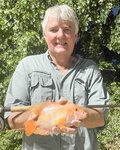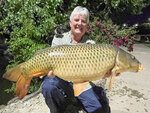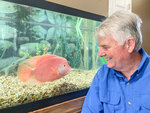


Granbury's Barry Osborn and fishing records are as connected as beer and brats, politicians and promises, sweltering heat and August in Texas.
But even he can't believe what he recently learned.
Fishing on Lake Granbury this past July he had the catch of his life. It wasn't the size … he's caught plenty bigger. It was, however, unlike any other fish he's ever hauled in.
Without question it was his most unusual catch — and one of the most unusual in the history of fishing in Texas, or even in the United States.
And so began what he calls "the Cheeto Saga." Cheeto is what his wife Karen named the fish.
"I spent months finding a place to DNA test the fish. Finally, a few weeks ago we got the fish tested, and the results documented by the USGS (U.S. Geological Survey)," he said. "The DNA results were unexpected since the maternal DNA for the fish came back as an Amphilophus Trimaculatus (three spot cichlid)."
Osborn said Cheeto appears to be a three spot cichlid hybrid, and he said he was informed it is the first documented orange cichlid hybrid of the species in U.S. waters. The three spot cichlid, also known as the trimac or red-eyed cichlid, is a species of cichlid from Mexico and Central America.
“The USGS tracks non-native species in the United States, and I contacted them about the catch,” he said. “Cheeto is the first three spot cichlid hybrid fish that has ever been caught in the United States and currently has a listing with the USGS.
"What makes it unique is that it is all orange and does not show any of the typical outward physical characteristics of a three spot cichlid," Osborn said.
At press time, Osborn had been working with TPWD to get state record certificates for the fish.
RECALLING THE CATCH
“I saw an unusually bright orange fish in the water while I was fishing in June of 2022, but it stayed away from the shore and I could not get it to hit a fly. I went to fish in Alaska, chasing records, and did not return to fishing at Lake Granbury until July 2022,” Osborn recalled. “When I walked up to the shore, I immediately saw the bright orange fish a few feet away. I cast my carp slayer fly to the fish and it immediately engulfed the fly.
“I lifted the fish onto the bank and was surprised when I could not identify the fish. I knew it was a cichlid, and should not be in Lake Granbury, so I filled a bucket with water and placed the fish in the bucket.”
Osborn immediately took the fish home and put it in a 10-gallon aquarium, which was much too small for the fish. He decided to keep it until he could make an accurate identification.
“I contacted an inland fish hatchery at TPWD and told them about my catch. The timing was good because I was told the TPWD ichthyologist would be participating in a meeting with other biologists throughout the state, in the coming week,” he said. “I sent pictures to the TPWD ichthyologist, the Fort Worth Zoo, the Biodiversity Center in Austin, and I contacted several pet stores that carried cichlids.”
After much research Osborn determined that the fish was probably a red devil cichlid, or possibly a Midas cichlid. After receiving replies from all the organizations he had contacted, they came to the same conclusion.
“As a wildlife biologist, this catch became very exciting to me. Research indicated that this was the first documented catch of an Amphilophus species in Texas, and it appears that the fish had lived in the lake for over a month,” Osborn said. “I immediately began trying to acquire a location to have the fish DNA sampled to determine what species I actually caught. I contacted one of my professors at Texas A&M and eventually Texas A&M conducted a DNA test for me.”
Osborn said that Cheeto “is happily rearranging his aquarium.” He has grown quickly, moving to a 55-gallon aquarium and now a 75-gallon tank.
“We hope that remains big enough,” Osborn said with a smile.
While Cheeto weighed less than a pound when Osborn caught him, he is currently about 12 inches long and weighs around 2 pounds. He could grow to 15 inches long and live for more than 10 years, so the Osborns may have a pet for a while. Once Cheeto passes away, Osborn said he will join many other unusual species as part of the collection at Texas A&M University.
“The moral of the story is that non-native species should not be released into Texas waters,” Osborn continued. “Although Cheeto probably could not have lived through the winter, other non-native species have become established with devastating consequences to native fish populations and ecosystems.”
ANOTHER RECORD RECENTLY
Osborn recently added to his plethora of fishing records. He caught a common carp out of Lake Granbury that weighed 26.1 pounds and was 35.25 inches in total length.
It resulted in a Fresh Water Fishing Hall of Fame (FFHF) catch-and-release fly fishing world record and a Texas Parks and Wildlife (TPWD) fly fishing catch-and-release state record. It is also pending as an International Game Fish Association (IGFA) all-tackle length fly world record.
“I knew the common carp was a big fish when it hit and I was only using a 17-pound tippet, so I had to be very careful not to pull the hook during the fight,” Osborn said. “The common carp took me 11 minutes to land.
“I have fished in Granbury since 1989, and this was the biggest carp I have caught in the lake.
But then, what's a few more records to a man who has somewhere in the neighborhood of 500 records and awards and has been featured in Ripley's Believe It Or Not? With well over 100 official state records, he has about twice as many official TPWD state records than anyone else.
And many of his records were caught in Lake Granbury, including this one, which he caught with a fly rod, unlike the PLNOR (pole, line, no reel) method he created and loves.
"PLNOR fishing provides direct contact between you and the fish. You feel every bit of the fish’s movement and have more control over the fish when compared to using a rod and reel," he said.
In fact, his largest documented TPWD record was with this method, a 102-pound black tip shark. He's also caught sharks weighing more than 300 pounds with other methods.
Osborn's first TPWD record was a Lake Granbury water body record he caught with a fly rod on April 23, 2007.
"It has been replaced many times," he said humbly.
Which is OK with him, because he's registered many more records in its place.
A FAMILY OF RECORDS
Osborn did not grow up in a fishing family, though he did fish regularly with his grandpa since age 8. However, he and his wife Karen have been married 43 years, much of which has been spent fishing. And, of course, she has records as well.
"Karen is an excellent angler, and the first woman in Texas to achieve both the TPWD freshwater and saltwater Texas Elite Angler awards," he said proudly. "The IGFA just approved her All-tackle Length Pacific cod at 78 centimeters fork length (just over 30 inches).
"I have two daughters, both married, and two grandchildren. I have fished with all of them from Colorado to Florida."
They, likewise, have some records.
"My grandson, Braxton Mosley, now 10, documented, and still holds the Lake Granbury junior angler common carp rod-and-reel record at 12 pounds. My granddaughter, Alexis Mosley, now 9, documented, and still holds, the junior angler state record blue catfish (0.83 pounds) on a fly rod when she was four years old," he said proudly. "It took me till I was in my 40s to get my first state record!"
In all, Osborn, who has lived in Granbury since 1989, has caught fish on more than 25 water bodies, including 17 lakes, four rivers and six oceans and bays. He even caught a world record blue/black rockfish from the Gulf of Alaska with a fly rod.
Osborn, who fishes about three days a week, has also received the Presidential Champions award for his fishing activities, which required the documentation of 5,000 hours of fishing.
NO PROFESSIONAL PLANS
But Osborn has never once considered taking up fishing as a profession.
"I have really enjoyed fishing for fun, and fishing for records. I have participated in
a few local tournaments, but tournament fishing does not really appeal to me," he said.
He does, however, enjoy teaching young anglers to fish. He is a sponsor of the Lake
Granbury C.A.S.T for Kids organization, and he and Karen volunteer to help with
the event every year. They also participated in the recent Brazos River Authority fishing event.
"Helping kids catch their first fish brings me great pleasure," he said.